After Halloween: Novel Writing
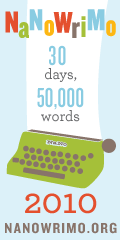 Tonight, children go trick-or-treating, and many adults go to Halloween parties, thereby, perhaps, proving Ogden Nash’s line that children get more joy out of childhood than adults get out of adultery. For myself, though, I’ll be counting down the minutes to midnight, scrawling notes and making plans. Because at 12 AM, November 1, National Novel Writing Month begins.
Tonight, children go trick-or-treating, and many adults go to Halloween parties, thereby, perhaps, proving Ogden Nash’s line that children get more joy out of childhood than adults get out of adultery. For myself, though, I’ll be counting down the minutes to midnight, scrawling notes and making plans. Because at 12 AM, November 1, National Novel Writing Month begins.
National Novel Writing Month, more accurately International Novel Writing Month, is a worldwide challenge anyone can sign up for: you pledge to write 50,000 words in the month of November. You have to have those words written by midnight, November 30; otherwise, anything goes.
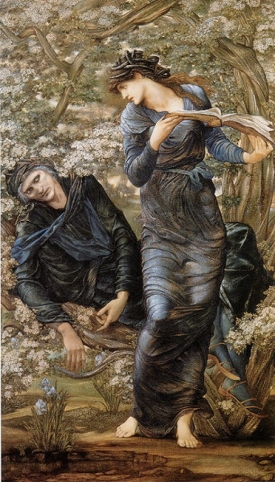 NaNoWriMo, as it`s unattractively abbreviated, began in 1999 with 21 people in the San Francisco area, six of whom hit the 50,000 word mark by the end of the month. The second year, there were 140 people, from around North America (including Canada; already the event had become international). Of those 140, 21 completed their novel. In 2001, the event caught fire on the internet, and five thousand people signed up. Over 700 finished their book by the end of the month.
NaNoWriMo, as it`s unattractively abbreviated, began in 1999 with 21 people in the San Francisco area, six of whom hit the 50,000 word mark by the end of the month. The second year, there were 140 people, from around North America (including Canada; already the event had become international). Of those 140, 21 completed their novel. In 2001, the event caught fire on the internet, and five thousand people signed up. Over 700 finished their book by the end of the month.
NaNoWriMo gets bigger every year: over 100,000 participants in 2007 and above 15,000 complete novels, in 2008 119,000 sign-ups and over 21,000 completions, last year more than 165,000 people and 32,000 finished novels. Over 200,000 participants are expected this year. Along with the increase in numbers has come an increase in organisational complexity; better servers, affiliations with other organisations, a grant program for young novelists, and pep-talk e-mails for participants from established writers. NaNoWriMo’s now officially a non-profit organisation.
A number of spin-offs have developed out of NaNoWriMo. April sees the same people behind NaNoWriMo organising Script Frenzy, a month for writing 100 pages of script for film, drama, graphic novel — any form that requires a script to be written. April also brings National Poetry Writing Month.
The rules for the novel-writing challenge are simple. You sign up on the NaNoWriMo site. Then, starting at midnight, you write 50,000 words of a book you hadn’t previously begun. It can be any genre, any style, any approach, any language. Post your word count as you go along, if you like. You don’t have to finish the story to win the challenge; just write 50,000 words of it.
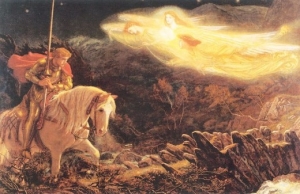 NaNoWriMo operates on the honor system. You write your novel, and upload it to the NaNoWriMo servers for verification at the end of the month; there are techniques for scrambling the text while keeping the word count the same. Verification brings nothing but the satisfaction of doing it, and the right to call yourself a winner.
NaNoWriMo operates on the honor system. You write your novel, and upload it to the NaNoWriMo servers for verification at the end of the month; there are techniques for scrambling the text while keeping the word count the same. Verification brings nothing but the satisfaction of doing it, and the right to call yourself a winner.
What helps make NaNoWriMo addictive is the experience of a writing community. At the same time that you’re working away on your novel, tens of thousands of people — hundreds of thousands, perhaps — are working on theirs. And posting about it on the NaNoWriMo forums. The experience of writing, the challenges of research and inspiration and everything else, becomes almost a mainstream concern.
Groups of participants in cities and regional centres often have write-ins, places to meet on a regular basis and write. NaNoWriMo’s so popular, in fact, many cities have Municipal Liasons, who organise events like Kick-Off and “Thank God It’s Over” parties. The event’s local as well as global.
It goes without saying that most of the novels completed during the month aren’t very good. That’s not the point. These are first drafts. You can use an outline, but the aim of NaNoWriMo is to generate text, to get words down on paper, to give you something you can revisit and change later. To get you thinking, to set you in motion.
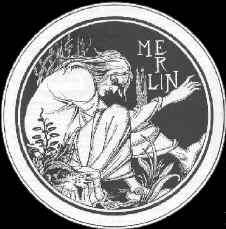 Or, at least, that’s how I approach it. This’ll be my fourth year taking part. I find NaNoWriMo’s a great exercise, and lots of fun. There’s an exhilaration to beginning a novel without quite being sure of everything, without really knowing where it’s going to go. You learn things as you write, about the story and about writing.
Or, at least, that’s how I approach it. This’ll be my fourth year taking part. I find NaNoWriMo’s a great exercise, and lots of fun. There’s an exhilaration to beginning a novel without quite being sure of everything, without really knowing where it’s going to go. You learn things as you write, about the story and about writing.
My first year, I wrote over 90,000 words of a long fantasy story. In the end, I decided it wasn’t a bad start, but not something I felt compelled to work on any further. The next year, I wrote just over 50,000 words of a story I’d been thinking about for a while; I spent time re-writing, usually frowned upon during NaNoWriMo, but I learned how to tell the story I had in mind, what sort of voice I needed to use for it. I didn’t finish the book, but I’m more excited about the idea of it than ever.
Last year, I wrote an alternate-history gothic — a gothic romance set in a reality where England won the Hundred Years’ War. The story took place in 1817, and featured alternate-reality versions of Coleridge, Shelley, Byron, and a number of other figures. The fascinations of researching historical detail and figuring out plot structures were almost too much for me; I only started writing on November 18, but I just managed to make 52,000 words by the end of November 31. I kept going, and finished a first draft of the novel (106,000 words total) on Christmas Day. I’m working on further drafts now, and I’m still excited about it.
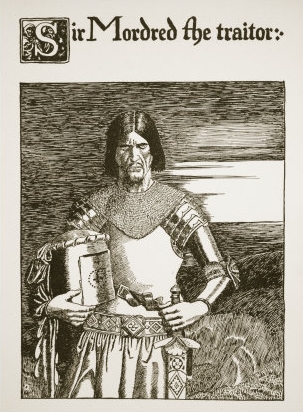 But it goes on hold for the next month. This year, I’m planning a high-magic Arthurian fantasy. A couple of very different songs about the character of Modred (or Mordred; for no real reason I prefer the briefer spelling) caught my attention during the year, and got me started thinking about who he was and I could do with him. So I’ve been pondering what intrigues me about the Arthurian legend in general; you can see some images in this post that seem to me to capture something about the power of the Arthur stories. But what about Modred in particular?
But it goes on hold for the next month. This year, I’m planning a high-magic Arthurian fantasy. A couple of very different songs about the character of Modred (or Mordred; for no real reason I prefer the briefer spelling) caught my attention during the year, and got me started thinking about who he was and I could do with him. So I’ve been pondering what intrigues me about the Arthurian legend in general; you can see some images in this post that seem to me to capture something about the power of the Arthur stories. But what about Modred in particular?
If Modred’s aunt is Morgan le Fay, could “le Fay” imply that there’s some elven blood in his family? If so, from where? Not from Uther Pendragon; but I can find nothing in Malory’s Morte d’Arthur (or any other traditional text) that says anything about the origin of Igraine, Arthur’s mother and Modred’s grandmother.
In Malory, Igraine married Gorlois, Duke of Cornwall, from which marriage came Morgan, Morgause (Modred’s mother), and Elaine. Uther Pendragon then falls in love with Igraine, and Merlin manipulates affairs so that Uther sires Arthur on Igraine while magically cloaked in the guise of Gorlois. Years later, Arthur and Morgause get together to beget Modred, whose incestuous birth is a symbol of the sin that eventually brings down Arthur and the Round Table; it is Modred who kills Arthur in battle, and is killed by him.
Okay, so, if I assume the existence in this story of some kind of of fay folk or elven race, then perhaps Igraine comes out of that background. Maybe she was exiled, or fled? Malory doesn’t actually specify that Gorlois was Morgan’s father, that I can see; maybe Morgan’s a full elf child Igraine took with her? Then Morgause, Elaine, and Arthur are all half-elven, and since both his parents are half-elves, so’s Modred.
I’m not wild about Arthur the half-elf, but perhaps half-elven blood means only that the half-elf appears human but actually has remarkable gifts, or the potential for some remarkable destiny. Morgause’s other children include Gawain and Gareth, while Elaine was the mother of Galahad the Grail Knight, so that sounds plausible.
Modred’s a fated child, born of incest; perhaps incest’s common among the elves, or, if Igraine’s been exiled and was originally of the nobility, perhaps it’s a royal tradition. Perhaps, rather than being a villain from birth, Modred’s actually a bitter moralist, which led to his exposing the infidelity of Gwenever and Launcelot, and to his usurpation of Arthur’s crown. In fact, perhaps what we see of Modred in the Arthurian legend is only half his story; perhaps he’s really involved in elven politics, the intricate schemes of some ancient convoluted inhuman empire. Maybe he’s a dark magician as well as a knight …
Basically, I’m thinking: what if Modred were Elric?
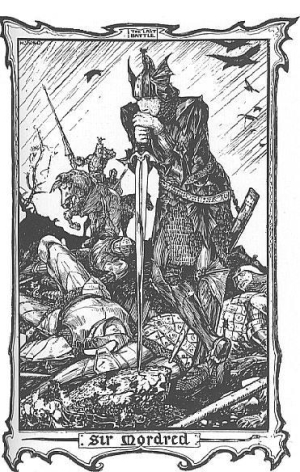 It’s a good hook; it intrigues me. Looking around the web, I’ve found an image by illustrator H.J. Ford which seems to me to resonate with the notion (you can see it over to the left). So I’m writing an Arthurian fantasy with Modred as an anti-hero.
It’s a good hook; it intrigues me. Looking around the web, I’ve found an image by illustrator H.J. Ford which seems to me to resonate with the notion (you can see it over to the left). So I’m writing an Arthurian fantasy with Modred as an anti-hero.
I’ll use Malory as my key text, the basic source for my myth. But I’ll probably go beyond Le Morte d’Arthur for some elements; the battle of Mount Badon isn’t in there, for example, and that might be useful background. Anyway, one of the fascinating things about the Arthurian story is the way it’s influenced so many writers, sometimes in unexpected ways. T.S. Eliot’s The Waste Land is a great example, using (indirectly) a fruitless Grail Quest as an image of the barrenness of modern civilisation. On the other hand, Eliot later converted to Anglicanism, finding meaning in religion; his Four Quartets illustrate the conflict of time and transcendence. Maybe I can use those poems as a source for imagery, for structural ideas … and weigh them one against another, sorting through ideas of meaning and barrenness.
I want to write more than 50,000 words this year. If I can write that much in less than half a month, as I did last year, then I should probably try to push myself harder. So I’ll aim to write two novels, 100,000 words or as close as I can, making one book between them. Each book will be divided in two; four quarters. Four quartets.
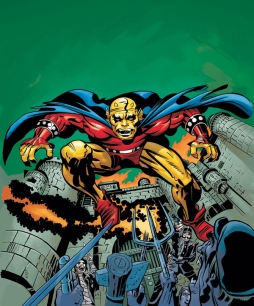 Let’s say the first half deals primarily with the Arthur story as we know it. Then the death of Arthur comes at the midpoint of the overall story. Perhaps Modred receives a prophecy that he and Arthur will kill each other. Then I just have to figure out a way to weasel around the prophecy, and the fact of Modred’s death. And I’ll be free in the second half to extend the Arthur story, to come up with a fate for Modred based on his own personality and experiences. Probably that’d deal more with the elves, with magic.
Let’s say the first half deals primarily with the Arthur story as we know it. Then the death of Arthur comes at the midpoint of the overall story. Perhaps Modred receives a prophecy that he and Arthur will kill each other. Then I just have to figure out a way to weasel around the prophecy, and the fact of Modred’s death. And I’ll be free in the second half to extend the Arthur story, to come up with a fate for Modred based on his own personality and experiences. Probably that’d deal more with the elves, with magic.
So there we go; idea, theme, structure. That should be enough to get me going. I can throw in all kinds of Arthurian elements to generate plot and word count, playing with ideas to see what works and what doesn’t. Will Merlin show up, or has he already been stuck under a rock by Nimue? Are there Saxon invaders, and thus perhaps Norse pagans? What about Roman survivals, and Roman pagans? The possibilities seem endless.
Which, as I say, is largely the point of the exercise, to face the limitless potential of the novel form and begin the process of turning them into something finite and actual. To begin writing. To get words on the page. To make choices, some of which will work and some of which won’t, but all of which will teach you something.
I’ll be writing more about this process over the next few weeks. We’ll see how my word count goes.
Matthew David Surridge is the author of “The Word of Azrael,” from Black Gate 14. His blog is Hochelaga Depicta.
Interesting stuff. I was writing an Arthurian-esque historical fantasy novel for Novel Writing Month last year; I’d describe it as sort of like Watchmen but with Arthurian knights instead of costumed heroes. ;p
And I like your ideas about the Mordred novel: I listened to that Heather Dale song a few weeks ago, and I’m not at all suprised it inspired story ideas like that.
Best of luck with your novel, I won’t be doing the competition this year because I have school commitments, and I really need to work on my main novel.
(PS: I’m jealous that you can write so much so quickly; I’m dreadfully slow. >_<)
Arthurian Watchmen is a neat idea! Thanks for the good wishes; I’m a bit nervous, since this is a bit more than I’ve aimed at before, and I’m going in with less planned out than usual. Whether I’m fast or not I really don’t know; I think I’ve been lucky past Novembers with how much time I’ve been able to dedicate to it. We’ll see how it all goes this year …
My NaNoWriMo novel last year has ended up a big success for me personally. I can’t emphasize enough how great an experience it is.
[…] bits of Le Morte d’Arthur from a new angle. I’m still going with the basic idea I outlined in my first post on NaNoWriMo; the Arthur story from Modred’s point of view, but a Modred who is half-elven and as deeply […]
[…] there. So it’s still very possible. (You can read some thoughts on National Novel Writing Month here, some talk about the Arthurian legends that inspired my plot here, and a more detailed discussion […]
[…] in National Novel Writing Month (you can see my previous thoughts on this year’s NaNoWriMo here, here, here, and here). Still, a few things have become clear to me about the shape of my story; I […]
[…] November, I blogged about my participation in NaNoWriMo. The following is an excerpt from what I wrote that month, for […]